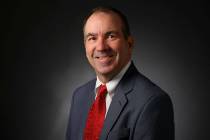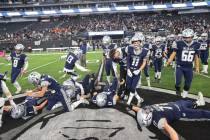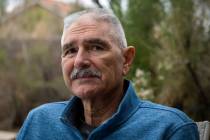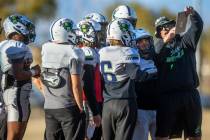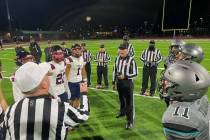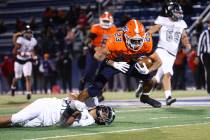While Goodell fumbles as commish, new book celebrates Rozelle’s savvy
If you spend any time around Jerry Izenberg, the 84-year-old Henderson resident and sports columnist emeritus of the Newark (N.J.) Star-Ledger — columnist emeritus is a title he bestowed upon himself; it pretty much means he gets to write about horse racing whenever he wants — then you know he also is a storyteller emeritus.
Sports stories are to Izenberg what female job applicants are to Mitt Romney. He has binders of ’em. Sometimes he’ll tell the really good stories more than once, and he’ll make them sound just as interesting, funny or poignant as the first time he told them.
Such as the one about Pete Rozelle, who had arranged to speak to the handful of sports writers who had covered every Super Bowl via conference call before Super Bowl XXX. The NFL commissioner spoke of each man personally. Anecdotes were shared; laughter was shared.
The perpetual suntan had long since vanished. The sports writers knew this.
Pete Rozelle was dying when his voice came over that speakerphone in Tempe, Ariz.
“It was weaker than we remembered, but stronger than we expected,” Izenberg writes in his new book, simply called “Rozelle: A Biography.”
“We had come to the time expecting to console an old friend, but just as he always seemed to do during the tough debates with us in more vibrant times, he had turned the situation completely around. It was the way he wanted it …”
So Jerry Izenberg knew he would write this book someday, but only when he got around to it, because sports writers are not always punctual. He would tell that story, about how after the commissioner got off the line, the Super Bowl sports writers raised their glasses in a toast about which Pete Rozelle would never learn.
With current NFL chief Roger Goodell fumbling the Ray Rice domestic abuse affair, and getting only one foot in bounds on other abusive affairs, concussions and other matters, the timing to write a new book about Rozelle could not have been better.
Because rarely, if ever, did Pete Rozelle fumble.
Izenberg writes about Rozelle learning through Las Vegas connections that Paul Hornung and Alex Karras, two of the game’s biggest stars, were wagering on NFL games not involving their teams.
This was before Rozelle had engineered the big TV money, the merger with the American Football League and “Monday Night Football” — before he had agreed to go along with this wacky Super Bowl thing that Lamar Hunt had proposed, though it wasn’t called that at first. The players’ incomes were only modest then, and so even the game’s biggest stars sought to supplement them.
Before the news broke — not months after security tapes were delivered to his office, because Pete Rozelle did not have a security force then — the young commissioner demanded the great and powerful football Oz meet him in his New York office.
Rozelle told Packers coach Vince Lombardi that he had better find a new Golden Boy because Hornung and Karras were through. Not just for two games, but for the entire 1963 season. And not to bother with appeals and such.
Appeals? Not on Pete Rozelle’s watch.
“He was new in the job, and yet he challenged the most powerful man in the league,” Izenberg writes. “The next day ... he had suspended both players. The day after that, the problem was gone.”
In fairness to Roger Goodell, the West Coast offense and Twitter weren’t around then. If Twitter had been around, Rozelle probably would have typed “They’re suspended. Indefinitely.” He would have saved the remaining 106 characters for his nemesis Al Davis.
Rozelle was wrong about as often as Arthur Fonzarelli of “Happy Days” was wrong.
Was Rozelle ever wrong?
Once. Probably.
After President Kennedy was assassinated on a Friday with Paul Hornung and Alex Karras sitting on the sidelines, Rozelle decided the NFL would play football that weekend. Some of his confidants said the commissioner came to regret that decision.
Rozelle, writes Izenberg, had called his old newspaper pal Pierre Salinger, Kennedy’s press secretary, from San Francisco. Salinger told the commissioner that JFK, a huge football fan, would have wanted the games to be played, for normalcy and all of that. Salinger said Bobby Kennedy had told him as much.
Did that make it right?
Izenberg remembers watching Jack Ruby shoot Lee Harvey Oswald in Dallas from the Yankee Stadium press room in New York before the Cardinals-Giants game.
Nothing seemed right that weekend.
Anyway, that story is in the book, as are binders of other stories about how Rozelle built and inspired a juggernaut that minimized all the other sports, even horse racing.
My favorite story is the one on the last page.
Izenberg writes about how little Anne Marie, the daughter Pete had raised alone and whom after the commissioner relentlessly doted in the manner the Doomsday Defense relentlessly doted after Fran Tarkenton, wanted a Talking Barbie for Christmas.
The stores were sold out.
The commissioner starting working his sources on the underground toy market.
So little Anne Marie Rozelle rushed to the tree on Christmas morning to find a Talking Barbie there, and when she pulled its string, it said: “Buenos dias. Donde esta Ken?”
Las Vegas Review-Journal sports columnist Ron Kantowski can be reached at rkantowski@reviewjournal.com or 702-383-0352. Follow him on Twitter: @ronkantowski.








